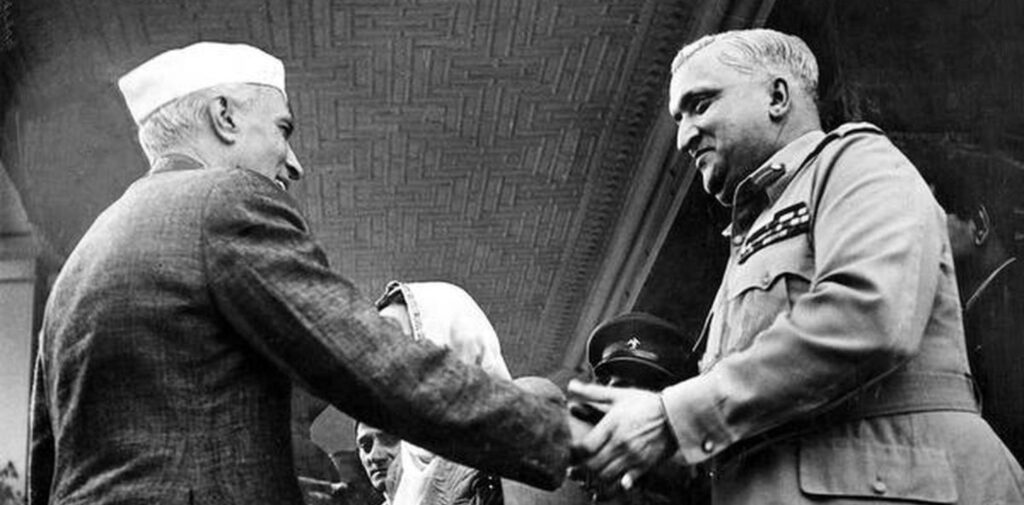The Kashmir issue has been one of the most significant and controversial topics in India’s history. While the region of Kashmir holds immense strategic, cultural, and religious importance, the decisions made during the early years after India gained independence have played a major role in shaping the ongoing conflict. Jawaharlal Nehru Unilateral Decision on Kashmir, particularly the way it was handled, has been a point of contention for many years. Many critics believe that Nehru’s actions, driven by his personal beliefs and political inclinations, were a betrayal of India’s national interest.
The Background
To understand the controversy around Nehru’s decision, we need to first look at the historical background of Kashmir. When India gained independence in 1947, the princely states that were part of British India were given the choice to join either India or Pakistan or to remain independent. The ruler of Jammu and Kashmir, Maharaja Hari Singh, initially chose to remain independent. However, this decision became difficult when tribal forces from Pakistan, backed by the Pakistani army, invaded Kashmir in October 1947.
Faced with this invasion, the Maharaja sought help from India. India, under the leadership of Nehru, agreed to provide military assistance, but on the condition that Kashmir would accede to India. The Maharaja signed the Instrument of Accession, and Indian forces were sent to defend the region. This event marked the beginning of India’s complex and troubled relationship with Kashmir.

Nehru’s Handling of Kashmir
Nehru’s approach to the Kashmir issue was heavily influenced by his own beliefs and his relationship with key figures like Sheikh Abdullah, the leader of Kashmir’s largest political party, the Jammu and Kashmir National Conference (NC). Nehru believed in the secular, democratic nature of the Indian state and saw Kashmir as a special case. He was keen on ensuring that the Muslim-majority region of Kashmir remained a part of India, but he was also careful to maintain its distinct cultural and political identity.
At the time, Nehru had a deep personal bond with Sheikh Abdullah and believed that the Sheikh’s leadership was essential for the future of Kashmir. Nehru’s connection with Abdullah led to a series of decisions that were not always in line with national interests, and they are often viewed as a betrayal of India’s long-term strategic goals.
One of the key moments in this process came in 1948, when Nehru, after military intervention in Kashmir, took the Kashmir issue to the United Nations. This decision would become one of the most controversial moves in India’s history.
The United Nations and the Kashmir Dispute
After the conflict in Kashmir broke out in 1947, India and Pakistan both took their cases to the United Nations. In January 1948, Nehru agreed to a ceasefire brokered by the UN, which ended active fighting between Indian and Pakistani forces in Kashmir. However, Nehru also agreed to a UN resolution that called for a plebiscite to be held in the region, allowing the people of Kashmir to decide whether they wanted to remain with India, join Pakistan, or remain independent.
This decision is often criticized for several reasons. First, Nehru’s decision to go to the UN was seen as unnecessary by many in India. The country had already sent its troops to Kashmir and had a military advantage. By agreeing to a UN-mediated ceasefire, Nehru effectively gave Pakistan a seat at the table in a dispute that many believed was India’s internal matter. The decision to agree to a plebiscite further complicated the situation, as it tied India’s hands in the future.
Second, the plebiscite was never held due to the conditions set by the UN, which included the withdrawal of Pakistani troops from the region. Pakistan refused to comply with this condition, and the plebiscite never took place. Despite this, India’s commitment to the plebiscite remained a point of contention for decades, and it created a sense of uncertainty in Kashmir that persists to this day.

The Article 370 Dilemma
Nehru’s decision regarding Article 370 of the Indian Constitution, which grants Jammu and Kashmir special status, has also been a matter of significant debate. The article was introduced in 1949 to protect the unique cultural and political identity of Kashmir. While Nehru argued that Article 370 was necessary to maintain the autonomy of Jammu and Kashmir, critics believe that it has allowed separatist sentiments to flourish in the region.
The special status granted to Kashmir through Article 370 created a situation where the region operated under a separate set of laws from the rest of India. It limited the rights of non-Kashmiris to settle or buy property in the state and allowed the state government to have more autonomy in matters of governance. While this may have been seen as a way to preserve Kashmir’s unique identity, it also fueled the perception of alienation among other parts of India and allowed Pakistan to use the issue to stir up unrest in the region.
The Consequences of Nehru’s Decisions
The consequences of Nehru’s decisions on Kashmir were far-reaching and continue to affect India’s relationship with Pakistan and its handling of internal security issues in the region. By going to the UN and agreeing to a plebiscite, Nehru inadvertently internationalized the Kashmir issue. This made it difficult for India to pursue a resolution to the dispute without facing global scrutiny and pressure.
Furthermore, by allowing the creation of Article 370, Nehru set the stage for decades of political instability in Kashmir. The special status of the state, while meant to protect its autonomy, created a complex legal and political situation that made it difficult to integrate the region fully into India. The political landscape of Kashmir remained volatile, with both pro-India and pro-Pakistan factions emerging, and separatist movements gaining traction in the 1980s and 1990s.
The situation escalated when militancy and insurgency took root in the region, supported in part by Pakistan. The presence of separatist leaders, combined with the political alienation of large segments of the population in Kashmir, led to widespread unrest. India’s response to these challenges was often heavy-handed, resulting in a cycle of violence that further strained relations between Kashmir and the Indian government.

Nehru’s Legacy and the Kashmir Issue
Looking back at Nehru’s handling of the Kashmir issue, it is clear that his decisions were shaped by his vision of India as a secular, democratic state. However, his idealism led him to make decisions that were not necessarily in the national interest. His relationship with Sheikh Abdullah and his desire to maintain Kashmir’s special status resulted in policies that failed to address the complexities of the region. Moreover, Nehru’s unilateral decision to go to the UN and agree to a plebiscite has led to decades of diplomatic and military challenges for India.
While Nehru is regarded as one of the founding fathers of modern India, his handling of the Kashmir issue remains one of the most debated aspects of his legacy. The Kashmir conflict has had a lasting impact on India’s relations with Pakistan, its internal security, and the political landscape of the region. Nehru’s decisions, though made with the best of intentions, have often been viewed as a betrayal of India’s long-term strategic interests, leaving the nation to grapple with the consequences of his actions for generations to come.
Conclusion: Nehru Unilateral Decision on Kashmir
The Kashmir issue is one of the most complicated and contentious problems that India faces today, and much of its origins lie in the decisions made by Nehru in the years after independence. While Nehru may have had good intentions in trying to protect Kashmir’s autonomy and maintain its place within India, his unilateral decisions, particularly regarding the plebiscite and Article 370, have had long-lasting consequences. These decisions created an environment where the Kashmir conflict became not only an internal matter but an international issue, complicating India’s efforts to resolve it.
Nehru’s handling of Kashmir is often seen as a betrayal of national interests because it placed India in a vulnerable position both diplomatically and strategically. Today, as the situation in Kashmir continues to evolve, it is important to reflect on these historical decisions to better understand the complexities of the region and how it can move towards a lasting peace.




